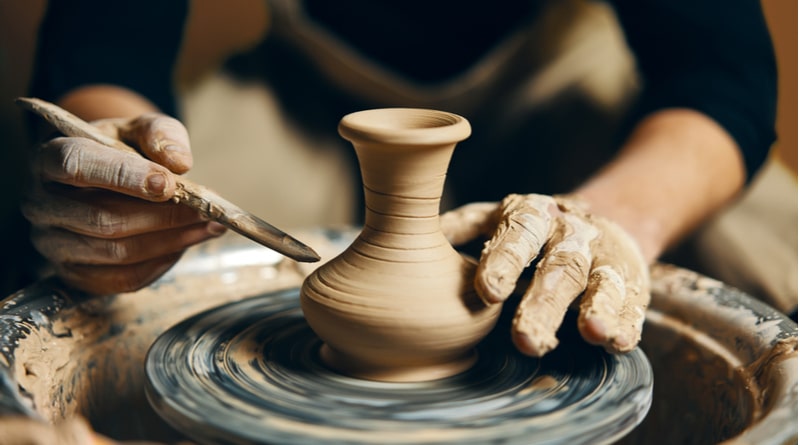What are Ceramics?
Ceramics are generally made by taking mixtures of clay, earthen elements, powders, and water and shaping them into desired forms.
Once the ceramic has been shaped, it is fired in a high-temperature oven known as a kiln. Often, ceramics are covered in decorative, waterproof, paint-like substances known as glazes.
What 3rd level courses are available?
Universities and colleges in Ireland are offering courses in the following subject areas:
- Ceramics Introductory Course – This course provides an introduction to the versatility of clay with step-by-step instruction and hands-on practical work.
- Ceramics – the practical study of ceramics through the creation of individual pieces under the guidance of an experienced potter. This course includes basic coil and slab building techniques, pinch pots and mold making, and a variety of decoration methods and glaze applications.
- Ceramics Skills & Design Course – an intensive skills-based programme with an excellent reputation nationally and internationally, this course specialises in production skills, clay and glaze technology, kiln theory and operation, surface treatments, drawing and design, and the history of ceramics.
- Ceramics: Processes and Techniques – this course offers an introduction to ceramics and students are introduced to different types of clay, their properties, and uses as well as the relevant terminology and functions.
- Ceramics/Glass – this course focuses on different types of creative practice, from design for manufacture to uniquely crafted art objects and architectural framing of ceramics, glass, and related materials.
- Crafts and Textiles with Ceramics – this course will provide students with a broad textile and craft education base and allow students to expand their textile practice and incorporate new ways of working with textiles and ceramics.
- Design: Ceramics Glass & Metals, Jewellery Skills – the study and practice of using basic tools to approach the different aspects of jewelry making and design.
- Design: Ceramics Glass & Metals, Stained Glass – the study of stained glass craftwork with an emphasis on design and development of techniques.
Taking a Ceramics Course in college
Courses in Ceramics are practical and aim to develop individual creativity and skill through practice.
Courses can take place full-time or part-time and range from a few weeks to 1 or 2 years for more in-depth study. Continuous assessment will take place in the form of individual projects and written, oral or visual presentations of portfolios and exhibitions.
Depending on the type of course you choose, classroom courses take place at institutions with superb facilities that include electric, gas, and wood-fired kilns as well as a variety of materials and tools that are needed to build up an extensive knowledge of techniques and processes. Students have their work areas with an electric wheel, workbenches, and drying racks.
The ceramics course specialises in production skills, clay and glaze technology, kiln theory and operation, surface treatments, drawing and design, the history of ceramics, and contemporary practice.
Career options
After completing a ceramics course students will be equipped with many practical hours and all the theory on techniques and processes to pursue a range of career paths. They could choose to freelance and be self-employed with commission work or as ceramic artists or potters who sell their works to individuals, art galleries, craft fairs, or showrooms.
The e-commerce market has opened up for many artists to sell their creations online.
Related jobs include:
- Potter
- Design Studio Owner
- Design Studio Manager
- Design Studio Assistant
- Ceramicists
- Model Maker
- Ceramic and Glass Designer
- Product Designer
- Ceramic Engineer
- Educator
- Artist
Further study
For those who are interested in focusing on business within the industry, it could be beneficial to study further in Business Management and Administration fields or look into courses on e-commerce or marketing.
FAQ
What materials would you recommend to get started in ceramics?
Clay, an apron and towels, a small bucket for holding water or slurry as you work, two to three large buckets for clean-up, one or more sponges, a large soft brush (bamboo or Sumi are best), wooden modeling tools for trimming, a potters needle, a potter’s wheel.
What are some basic techniques and terms used by potters and ceramic artists?
Throwing – the time from when the clay first touches the wheel to the time when the wheel is stopped.
Trimming – To finish the pot by removing excess clay on the lower part, or to give the pot walls and bottom an even consistent thickness throughout.
Slip Carving or Sgraffito – A pottery decorating technique produced by applying layers of colour or colors and then scratching off parts of the layers to create contrasting images, patterns, and texture.
Bisque Firing – Any pottery that has been fired in a kiln without a ceramic glaze.
Glazing – adding a coating of a vitreous (glass-like) substance that is then fused to the ceramic body through firing.
Where can I take a Ceramics course?
Explore your options here
Did You Know?
· Pottery remains have been found in a cave in China’s Hunan province and have been dated from 15,400 to 18,300 years old. That’s at least 1000 years earlier than other pottery fragments from the same region, which were previously thought to be the oldest in the world.
· The oldest known ceramic artifact is dated as early as 28,000 BC, it is a statuette of a woman and is named the Venus of Dolní Věstonice.
· The Terracotta Army is a collection of terracotta sculptures depicting the armies of Qin Shi Huang, the first Emperor of China. These pieces are over 2200 years old and so far more than 8000 soldiers, 130 chariots with 520 horses and 150 cavalry horses have been discovered with the dig still currently active.












Hi I’m looking to do a part time ceramics diploma/ degree course are there any I live in kinvarra co. Galway.
Hello! I live in Dublin1. I am interested of ceramic and I want certificate of attendance